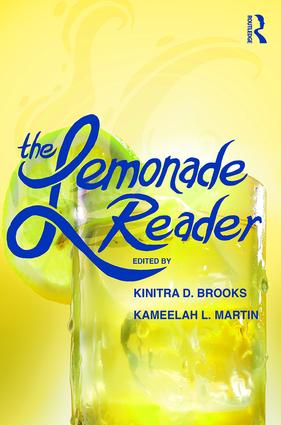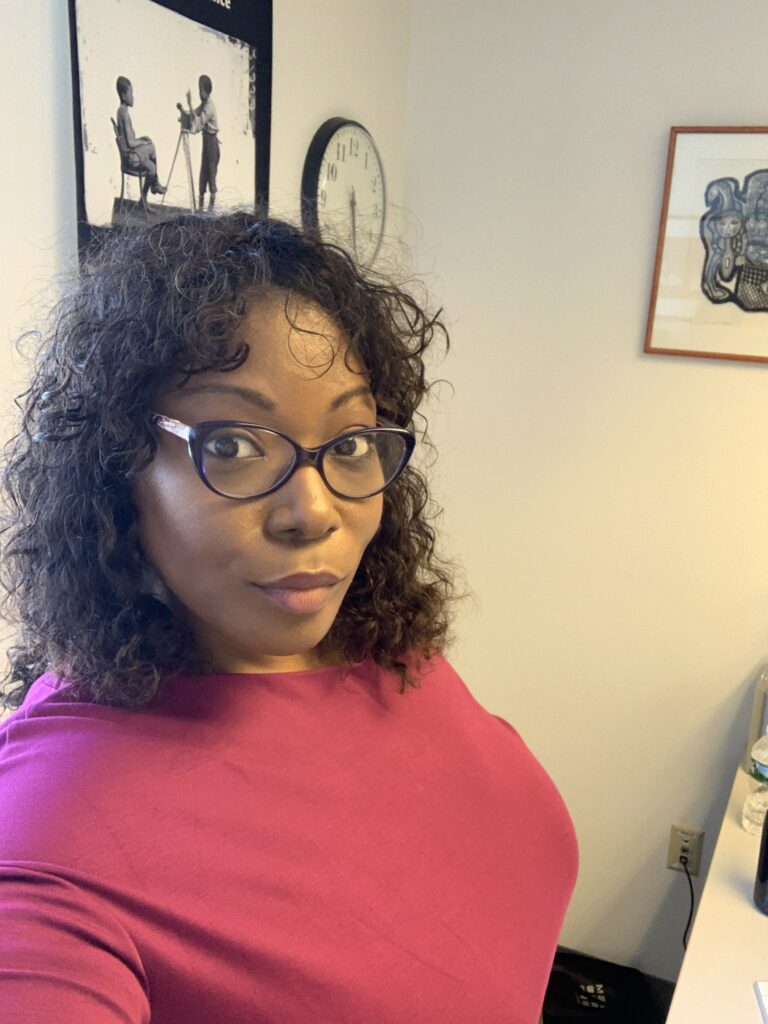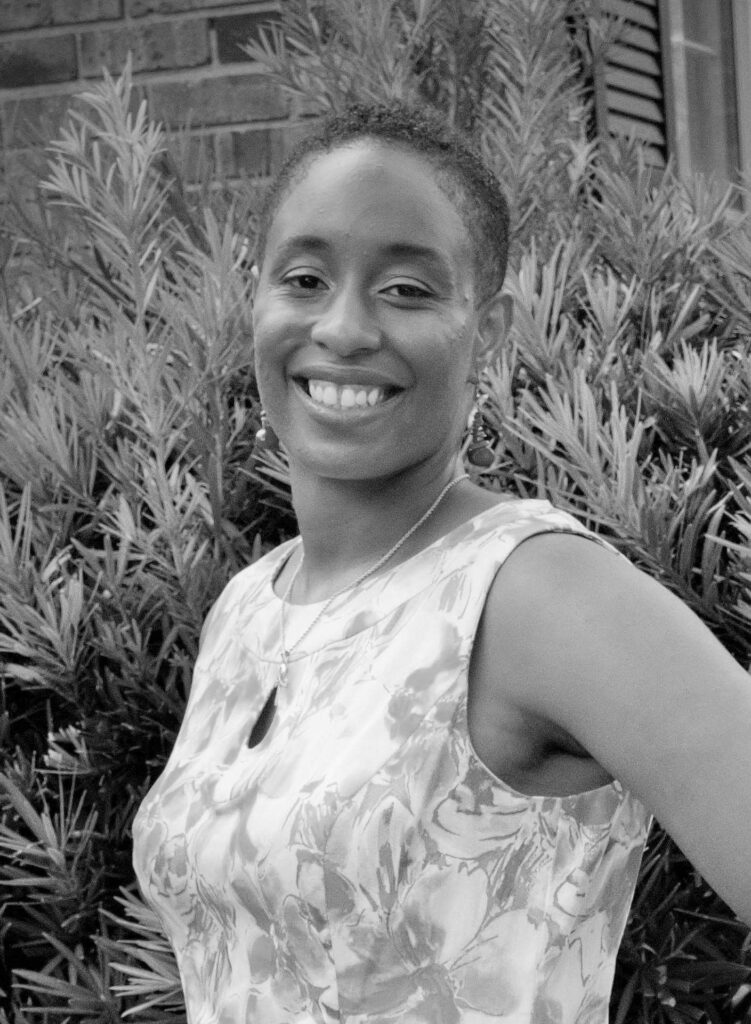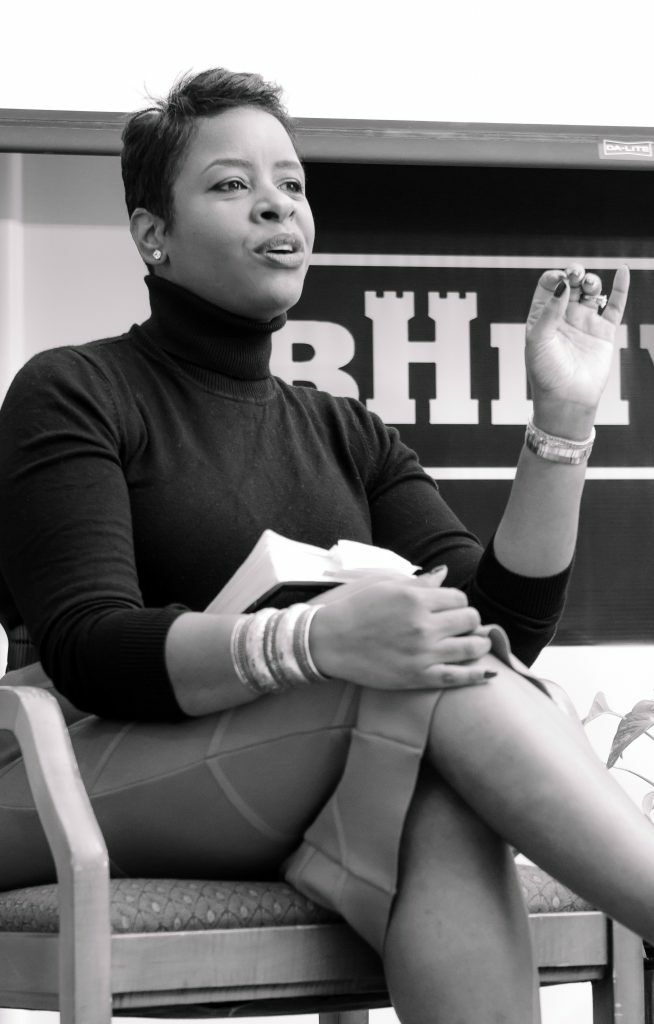The Lemonade Reader: Black Feminists Read Beyoncé

The Lemonade Reader, edited by Kinitra D. Brooks and Kameelah L. Martin, is a critical study on not only Black women, Black feminism, and Black popular culture, but what many deem as “Beyoncé Studies.” Why Beyoncé, you ask? Well, some might say because she’s iconic. Others might suggest because her business acumen runs circles around America’s top MBA programs. I say because she is a cultural phenomenon and because phenomena rooted in human experience, particularly that which moves us, must be studied — critically.
Tamura: Let’s cut to the chase: what makes an icon, and is Beyoncé one or nah?
Kinitra: We had this conversation on my Facebook wall a few days ago. I could see both sides. I didn’t necessarily take what Dionne Warwick said as shade because Beyoncé has longevity, but not the longevity of a Warwick, Franklin, and/or Ross even as she was well on her way to becoming that sort of icon. And then Kameelah read me for filth on my own damn page!
Kameelah: I don’t know what necessarily defines an icon, but there is no doubt about Beyoncé’s influence on the culture, her influence in the music industry, fashion, all sorts of things. I mean, what else do you need from an icon?
Kinitra: And Dr. Birgitta Johnson, one of the contributors to the volume, followed up with receipt upon receipt of not only Beyoncé’s influence on the culture, but also her business acumen in owning all of her own music publishing and production through what would eventually become Parkwood studios.
Tamura: So, this is interesting. Warwick acknowledges and clearly admires Beyoncé’s influence and business sense. She praised her growth as an artist and her control of her career and image. In that sense, Beyoncé is truly in a lane of her own. While I’m not ready to put a pin in what makes an icon or not, I think Warwick names something that is important to engage and that is, one, sustainability, and two, the timeless nature of universal messaging around themes such as love, joy, hope, etc. I think Beyoncé does this but in a way that’s different from previous generations. Would you agree or disagree? Also, does messaging even matter? Might her particular impact be enough? Who’s to say she hasn’t already made many “classics?” Time will tell, I guess. What say you?
Kameelah: I gave this idea of Beyoncé being timeless serious thought some years ago—around the time of the B’day album—when I was still deciding how far this thing with me and Bey was going to go. I remember thinking that her early ballads strived toward universal messaging. “Dangerously in Love” stood out as trying to hit that mark. I asked myself, in 30 years will folks be checking for the ballads as the go-to Beyoncé joint? I saw the effort to make that song (in performances especially) timeless, like many a Whitney Houston song. It didn’t work for me. The song was dope and all, and her live performances were epic in the way that she demonstrated how much she studied classic performers, but I didn’t see her as an artist that was timeless. Not then—it was like she was trying too hard. While hella folks were diggin’ it, I don’t think her particular positionality (Black, female, southern—to start with) and the way she played it imbued a universal, timeless message.
And that’s not a bad thing. I rather enjoyed the Black girl sass in her vocal intonations, her signifyin’ ass lyrics, and code-switching. There is value in speaking to a particular audience—I felt very much a target of her messaging as a Black, southern woman. I could appreciate it. In her later music, when she frees herself from the respectability politics and yoke of her father’s management, she wrestles with her identity as an artist; and with Lemonade, I think she totally divests herself from the packaged, manicured, Whitney Houston-esque visage of herself. It is in that visual album that I think her messaging finally becomes honest and most impactful. It certainly conveyed a universal, timeless message for many Black women—and perhaps for other groups and other women as well. Maybe that will be her classic work. I dare say it already is!
Kinitra: I do think she has reached a level of timelessness—simply because she now spans multiple generations of folks. She is timeless in having decades of consistent hits. She has hits amidst generations before and after us.
I also think it is necessary to put forth that though Lemonade presents a less than perfected visage of her—it is still quite packaged. She only lets us in so far. I have seen this presented as something negative and I would push back against this reading. She has heavy boundaries between her personal and professional life, her internal self, and the consummate professional persona we all know so well. Instead of reading this as fake, why don’t we read this as some things just aren’t our business and any entrance into her family and marriage will be heavily orchestrated? And if we look at the personal and professional lives of some of her contemporaries—Britney Spears, Christina Aguilera, Mariah Carey—she has survived and thrived wonderfully. This isn’t shade at any of those performers, this is acknowledgment of the soul-crushing ruthlessness of the entertainment business.
Finally, Lemonade is definitely messaging that is so complex, we don’t always notice it. We have to look back at that elevator incident. It was an unorchestrated view of her family dynamics at one of its most difficult moments. We saw Solange fiercely fight (what many assume) for her against Jay-Z amid all the nasty rumors and innuendo of their marriage. There were harsh jokes about Beyoncé hiding in the corner and not doing anything. I believe she used Lemonade to rise up and push back against this false reading of her supposed weakness. Lemonade shows her as vulnerable but also strong and resolute in discovering who she is as a woman, wife, mother, and mogul—it is the perfect messaging.
Tamura: I think you both just brought it full circle for me. Love, respect, and honor to Ms. Warwick, but folks become iconic because they bring flavor, sass, expertise, vision, and creativity we’ve yet to see. To be sure, Beyoncé is both a remix of the ancestors and the embodiment of their wildest dreams. But she is also something yet to be defined.
I think the popular discourse around iconography raises questions of inspiration, on one hand, and foundational influence, on the other. The question, then, for me at least, is will her work and/or business model inspire and become foundational in some way to those to come? Is it original enough for this sort of influence? I think so. But we’ll have to see.
Another issue I see happening here is the age-old fight between high and low culture, with high culture always already standing in for what is deemed “classic.” This seems to be the underlying argument in Warwick’s statement. As Kameelah said earlier, Beyoncé signifies a certain kind of – respecta-ratchet (my words, not Kameelah’s) – southern Black woman-ness that works for so many of us. She can do “Dangerously in Love” if need be, but she can also get down and dirty and cuss us out if she needs to do that. All of this in mind, we really need to rethink the whole “classics” thing. But let’s play along for a minute. Let’s stretch the limits of “classics” to include the down and dirty. Any “classics” on Lemonade? And not just in terms of music. What about Black feminist “classics”? Might feminists, and particularly Black feminists, see Lemonade as a fruitful text?
Kameelah: I certainly stand by my position that Lemonade is in a class of its own and may just be an instant classic. I think its impact has been that profound. And don’t get me started on classic moments in the visual album—I might not be able to contain myself! There are endless one-liners and visual cues that will forever be sanctified in the church of respecta-ratchet. When she tosses her wedding ring and admonishes, “Try this shit again and you gone lose your wife.” Baaaabayyy! Or when Beyoncé queries, “What will you say at my funeral, now that you have killed me?” The songs “Sorry” and “Freedom” also come to mind as possible contenders for the classic title. The poetry of Warsan Shire, particularly Warsan versus Melancholy, now takes on classic status. If one really evaluates Shire’s work, it becomes evident that her digital poetry album is the structural inspiration for the visual album. Shire moves through “the seven stages of being lonely” in a way that clearly influenced the arc of grief and healing that is Lemonade. Warsan Shire is a poet who stood in her own glory prior to Lemonade, for certain. But inspiring Bey’s creativity and also adapting her poetry for Lemonade places Shire’s work on a different pedestal; not because of Beyoncé per se, but because Warsan versus Melancholy now stands as the ur-text for this and perhaps other projects to follow.
Kinitra: There are definitely classic songs and moments from Lemonade—such as when she pushes through those double doors and we first see her in that yellow Cavalli dress or when she throws her ring at the camera….at the camera! I would agree with Kameelah in terms of “Sorry” and “Freedom,” but I would also include “Formation,” “Daddy’s Lessons,” and “Hold Up.”
Lemonade is a hearkening back to the idea of the classic album from the second half of the twentieth century, in which each cut is solid and strong and integral to the journey of the album. Lemonade takes us on a journey, and to remove any portion would take away the classic nature as well as the strengths of the piece. It’s meant to be listened to as a whole.
I would also expand the idea of the impact Beyoncé made with this album we are discussing in terms of what is considered classic by focusing our attention on her CMT performance with the Dixie Chicks. So much about that performance was creating a classic moment by remixing what is thought of as classic—that white lace dress with the shoulders and length reminiscent of Loretta Lynn, but with a daring sheerness that challenged the conservative nature of country music. Her bringing brass band sounds to country music to highlight the African contributions to the creation of so much of America’s sound—including country music. Expanding the idea of what is considered “country” and what isn’t and the erasure of Blackness in Texas, as each woman initiated the song by saying Texas in their own unique way. And giving us long-time Black fans of country music a moment in the sun that didn’t involve Darius Rucker (from Hootie and the Blowfish) – I love country because my grandfather loved country.
Kameelah: In terms of Black Feminism, it goes without saying that Lemonade is valuable to the body of Black feminist texts. It becomes part of a long genealogy of Black women thinkers, creators, movers, and shakers who have been doing the work of Black feminism for generations. Beyoncé shows us that she is in the know by paying homage to Julie Dash’s Daughters of the Dust (1991), to the Black Lives Matter Movement, to traditions and matriarchs of Black cultural institutions that have sustained the community such as the Mardi Gras Indians and restauranteur Leah Chase. And I’d be remiss if I did not point out how Beyoncé is invoking one of the oldest Black female intellectual traditions that exists—conjuring, spirit work, hoodoo, and such. What Kinitra and I are calling Conjure Feminism. It moves all throughout the text and serves as a type of anchor for Black women as they move through an anti-black, anti-feminine world. There is much scholarship that establishes conjuring as a Black feminine practice and much more that is to come. Black women have long used spirit work to negotiate their existence. Lemonade is an intersectional text that is plenty useful as Black feminists twist and contort their priorities to meet the 21st-century reality. To ignore a text that “cause all this conversation” is negligible. Even if you aren’t a die-hard, card-carrying member of the Beyhive, Lemonade is an important text that grapples with Black feminist ideologies, identity politics, trauma, and healing in ways we cannot afford to ignore.
Kinitra: Agreed. We must acknowledge Conjure and Rootwork as Intellectual histories of Black women that are specifically rooted in the South and the Caribbean. We are highlighting these women as philosophers with the powers to create and shift reality in ways that center what Kameelah defined as spirit work in her first book, Conjuring Moments in African American Literature: Women, Spirit Work, and Other Such Hoodoo (2012). And I would like to take a moment to highlight the work we are doing and will continue to do on Conjure Feminism as well as invite others to participate.
We currently have a Call for Proposals for our special issue of Hypatia: A Journal of Feminist Philosophy on Conjure Feminism: Tracing the Genealogy of a Black Woman’s Intellectual Tradition that we are co-editing with Dr. LaKisha Simmons. And I got to spend this past year as a Hutchins fellow at Harvard University really beginning to outline and articulate my family’s own place in the traditions of conjure in my talk, “The Conjure Woman’s Garden” and essay, “Myrtle’s Medicines.” We are actively using Lemonade to have multiple scholarly conversations on multiple levels in ways that furthers the research we were already doing.
Tamura: Wow! You’ve done amazing work here. It’s both exciting and inspiring. Let’s say Beyoncé and her team get ahold of The Lemonade Reader. What would be the most important take away? And more, let’s say contemporary Black feminists sent her a “love package,” centering the Reader. What other texts might you include in the collection? Clearly, your text is in conversation with so many, dare I say “classics.” Off the top of my head, Chireau’s Black Magic (2006) immediately comes to mind. But if you were gifting her and her crew with six books, centering the Reader, what would you choose? And finally, any critiques? Lord knows, the Beyhive won’t appreciate this question. But, as a trained cultural critic who reads popular culture for the good and bad, I have to ask. Namely, what are we, as Black feminists, to do with her capitalism?
Kinitra: Let’s start at the end and go from there. I do think we should continue to have a conversation about Beyoncé and capitalism. But I agree with our contributor, Tami Winfrey Harris, who states in her interlude, “Formation and the Black Ass Truth about Beyoncé and Capitalism,” in that I itch at centering our critiques on Black women who benefit from capitalism. What are the politics of so many choosing to start their critiques with her and other Black women there? I’m torn because I do believe some of this is a backlash against Black women (finally?) capitalizing on their own bodies and talents when the entire American monetary system is grounded on the exploitation of our bodies as capital. This does not excuse Beyoncé—folks, for example, have righteously brought up the issues of the sweatshops that make her clothes. How does it complicate the capitalism issue when brown, often South Asian women are being financially exploited in her name? Simultaneously, I have seen non-Black women (feminists especially) use this as a way to push back at Beyoncé in ways that I am sure are steeped in misogynoir. I believe both of those things can be held in tension—a term I totally stole from your frequent use of it.
Kameelah: The issue of capitalism is a nonstarter for me as it concerns Beyoncé. It’s just not the hill I’m going to die on. I recognize that wealth comes with a great deal of responsibility and it often affords a great deal of creativity and the ability to act on that creativity in ways that beget more dollar, dollar bills, ya’ll. I’m not mad at Bey for any of it. And just like with her music, I imagine her business portfolio and capital investments have evolved over the decades. I’d be more interested to know how she has evolved because of these critiques. And equally important to this discussion is her philanthropy. She tossed a good bit of money specifically at HBCUs recently and provided scholarships for Black women. Can we also talk about the significance of that? She is not without fault and there are folks ready to fall off the cliff just to indict her as part of the capitalist patriarchal machine. I’m just not one of them.
Kinitra: I don’t see capitalism as the most pointed critique of Lemonade. For me, it is the lack of body diversity. Our contributor and your former student, Ashleigh Shackleford, discusses this in her interlude, “Bittersweet Like Me: When the Lemonade Ain’t Made For Fat Black Femmes and Women.” I remain flabbergasted as to how Beyoncé could make a film celebrating Black Southern women and no one is above a size four, except for the elders in the later interludes. What does it say that only older Black women could be considered acceptably fat? Even the ancestors that are studded throughout the film wearing white, women who lived during earlier times, were tiny and petite. I simply think it was a huge oversight. I’m a Southern Black woman. We are SOLID, even those of us who aren’t necessarily fat-bodied. And we were erased. I love Lemonade, but I found the willful exclusion of us…hurtful. And I believe Ms. Shackleford did as well.
Kameelah: I struggled with the use of Warsan Shire’s poetry. Even though it was adapted by Shire for the visual album, I still found it a bit troubling that Beyoncé took excerpts from poems and really reshaped the work of another artist to suit her own. I was quite familiar with Shire’s work and I remember cringing during the first viewing when I realized stanzas from different poems had been woven together to make Lemonade more cohesive. I’m still unsettled about it, actually. While Shire has an entirely new fan base, as a literary scholar I have to ask, what has Beyoncé’s use of the poetry done to its authenticity? How do we account for the removal of references to Islamic practice and faith in the original poems, for instance? Shauna Morgan delves into this question in her interlude, which I thought was such a necessary piece to include in the Reader. Many of the think pieces acknowledged Shire’s poetry and adaptation, but very few critiques have grappled with the issue of the poetry and the poet has remained pretty silent about it all.
I think another valid critique is that same-sex loving folk and queer Black men were also noticeably absent from the visual album.
Kinitra: I believe the most important takeaway is that you have to do the internal work to grow into your happiness. And it takes work, especially in a world that actively hates Black women and girls. And that Southern Black women have long been onto something in articulating and laying the pathway for their Black girl descendants to make such a journey of self-healing and self-discovery. Beyoncé has simply excelled at coalescing all of these insights into a 55-minute avante garde film/visual album.
Kameelah: I’m going to approach this from another angle. What I want Beyoncé and ‘nem to get from The Lemonade Reader is that something incredibly powerful transpired between Beyoncé and other Black women. My greatest curiosity is to hear Beyoncé articulate what it meant to witness the overwhelming response of Black women to Lemonade. Not everyone who contributed to the Reader is Black and female, nor is half the Beyhive, but I’m taking a point of privilege here because I recognized a dialogue happening between the messaging and imagery and narration of the visual album and Black women’s responses to it. There was a little bit of a hallelujah moment amongst Black women that no one else was privy to and it was beautiful. How did it make Beyoncé feel to be embraced in that way? I’m like, it was gooood for me. Was it gooood for her, too?
Kinitra: Whew! Books? I hate lists like these because you always leave something out. But I’m going to recommend three and leave the other three up to Kameelah.
- Mama Day by Gloria Naylor
- Venus in the Dark: Blackness and Beauty in Popular Culture by Janell Hobson
- Black Magic: Religion and the African American Conjuring Tradition by Yvonne P. Chireau
Kameelah: Mercy! Here goes: Sassafras, Cypress, & Indigo by Ntozake Shange because the journey to womanhood is arduous. It’s not a book, but so necessary to understand what Beyoncé is doing—Audre Lorde’s “Uses of the Erotic: The Erotic as Power.” And ironically, bell hooks’ Sisters of the Yam: Black Women and Self-Recovery.
****

Dr. Kinitra Brooks is the Audrey and John Leslie Endowed Chair in Literary Studies in the Department of English at Michigan State University. Dr. Brooks specializes in the study of black women, genre fiction, and popular culture. She currently has two other books in print: Searching for Sycorax: Black Women’s Hauntings of Contemporary Horror (Rutgers UP 2017), a critical treatment of black women in science fiction, fantasy, and horror and Sycorax’s Daughters (Cedar Grove Publishing 2017), an edited volume of short horror fiction written by black women. Her current research focuses on portrayals of the Conjure Woman in popular culture. Dr. Brooks recently served as the Advancing Equity Through Research Fellow at the Hutchins Center for African & African American Research at Harvard University during the 2018-2019 academic year.

Kameelah L. Martin is Professor of African American Studies and English at the College of Charleston in South Carolina, where she is also Director of the African American Studies Program. Dr. Martin’s research explores the lore cycle of the conjure woman, or black priestess, as an archetype in literature and visual texts. She is author of two monographs: Conjuring Moments in African American Literature: Women, Spirit Work, & Other Such Hoodoo (Palgrave 2013) and Envisioning Black Feminist Voodoo Aesthetics: African Spirituality in American Cinema (Lexington 2016). She is the Assistant Editor of the College Language Association Journal and has published in Studies in the Literary Imagination,Black Women, Gender, & Families, as well as the African American National Biography. She has edited special issues of Genealogy, South Atlantic Review, and co-edited a section of the Routledge Anthology of African American Rhetoric (2018).

Tamura Lomax received her Ph.D. from Vanderbilt University in Religion where she specialized in Black Religion and Black Diaspora Studies and developed expertise in Women, Gender and Sexuality Studies and Black British and U.S. Black Cultural Studies. In 2018, Dr. Lomax published her first single authored monograph, Jezebel Unhinged: Loosing the Black Female Body in Religion and Culture (Duke University Press). She also organized and guest edited the special issue, “Black Bodies in Ecstasy: Black Women, the Black Church, and the Politics of Pleasure” (Black Theology: An International Journal, Nov 2018). In 2017, Dr. Lomax curated #BlackSkinWhiteSin, a discourse on sex, violence, and the Black Church. In 2014, she published Womanist and Black Feminist Responses to Tyler Perry’s Cultural Productions (Palgrave Macmillan), a co-authored edited volume with Rhon S. Manigault-Bryant and Carol B. Duncan. She is currently at work on her latest book, Raising Non-Toxic Sons in White Supremacist America. She is the co-founder, CEO, and visionary of The Feminist Wire. For more or to conact, visit Bios.




Pingback: Friday Feminartsy Finds - Feminartsy